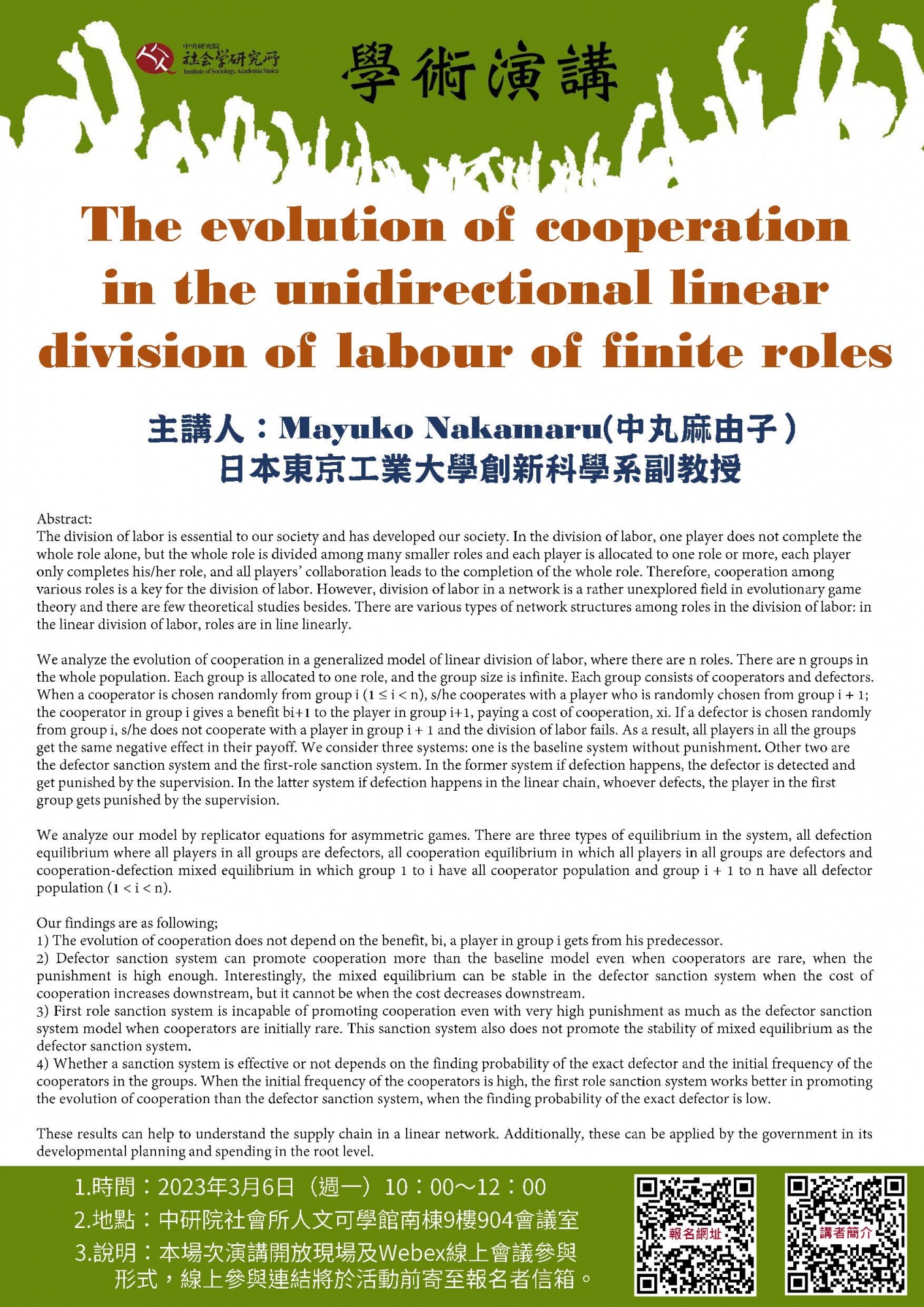中研院社會所3/6The evolution of cooperation in the unidirectional linear division of labour of finite role
2023-03-01
中研院社會所3月初邀請日本東京工業大學教授Mayuko Nakamaru來所演講,相關活動訊息如下,歡迎報名參加。
講題:The evolution of cooperation in the unidirectional linear division of labour of finite roles
講者:Mayuko Nakamaru(日本東京工業大學創新科學系副教授)
主持:江彥生(本所研究員兼副所長)
時間:2023.03.06(一),上午10時
地點:中研院社會學研究所904會議室(人文科學館南棟9樓)
報名網址:https://forms.gle/oW5qsGKmRi14EiU47
活動聯絡:黃小姐,an0317ny@ms17.hinet.net
演講簡介
The division of labor is essential to our society and has developed our society. In the division of labor, one player does not complete the whole role alone, but the whole role is divided among many smaller roles and each player is allocated to one role or more, each player only completes his/her role, and all players’ collaboration leads to the completion of the whole role. Therefore, cooperation among various roles is a key for the division of labor. However, division of labor in a network is a rather unexplored field in evolutionary game theory and there are few theoretical studies besides. There are various types of network structures among roles in the division of labor: in the linear division of labor, roles are in line linearly.
We analyze the evolution of cooperation in a generalized model of linear division of labor, where there are n roles. There are n groups in the whole population. Each group is allocated to one role, and the group size is infinite. Each group consists of cooperators and defectors. When a cooperator is chosen randomly from group i (1 ≤ i < n), s/he cooperates with a player who is randomly chosen from group i + 1; the cooperator in group i gives a benefit bi+1 to the player in group i+1, paying a cost of cooperation, xi. If a defector is chosen randomly from group i, s/he does not cooperate with a player in group i + 1 and the division of labor fails. As a result, all players in all the groups get the same negative effect in their payoff. We consider three systems: one is the baseline system without punishment. Other two are the defector sanction system and the first-role sanction system. In the former system if defection happens, the defector is detected and get punished by the supervision. In the latter system if defection happens in the linear chain, whoever defects, the player in the first group gets punished by the supervision.
We analyze our model by replicator equations for asymmetric games. There are three types of equilibrium in the system, all defection equilibrium where all players in all groups are defectors, all cooperation equilibrium in which all players in all groups are defectors and cooperation-defection mixed equilibrium in which group 1 to i have all cooperator population and group i + 1 to n have all defector population (1 < i < n).
Our findings are as following;
1) The evolution of cooperation does not depend on the benefit, bi, a player in group i gets from his predecessor.
2) Defector sanction system can promote cooperation more than the baseline model even when cooperators are rare, when the punishment is high enough. Interestingly, the mixed equilibrium can be stable in the defector sanction system when the cost of cooperation increases downstream, but it cannot be when the cost decreases downstream.
3) First role sanction system is incapable of promoting cooperation even with very high punishment as much as the defector sanction system model when cooperators are initially rare. This sanction system also does not promote the stability of mixed equilibrium as the defector sanction system.
4) Whether a sanction system is effective or not depends on the finding probability of the exact defector and the initial frequency of the cooperators in the groups. When the initial frequency of the cooperators is high, the first role sanction system works better in promoting the evolution of cooperation than the defector sanction system, when the finding probability of the exact defector is low.
These results can help to understand the supply chain in a linear network. Additionally, these can be applied by the government in its developmental planning and spending in the root level.
講者介紹: http://www.nakamaru-lab.mot.titech.ac.jp/
活動說明:本座談會開放現場及Webex線上會議參與形式,線上參與連結將於活動前寄至報名者信箱。

講題:The evolution of cooperation in the unidirectional linear division of labour of finite roles
講者:Mayuko Nakamaru(日本東京工業大學創新科學系副教授)
主持:江彥生(本所研究員兼副所長)
時間:2023.03.06(一),上午10時
地點:中研院社會學研究所904會議室(人文科學館南棟9樓)
報名網址:https://forms.gle/oW5qsGKmRi14EiU47
活動聯絡:黃小姐,an0317ny@ms17.hinet.net
演講簡介
The division of labor is essential to our society and has developed our society. In the division of labor, one player does not complete the whole role alone, but the whole role is divided among many smaller roles and each player is allocated to one role or more, each player only completes his/her role, and all players’ collaboration leads to the completion of the whole role. Therefore, cooperation among various roles is a key for the division of labor. However, division of labor in a network is a rather unexplored field in evolutionary game theory and there are few theoretical studies besides. There are various types of network structures among roles in the division of labor: in the linear division of labor, roles are in line linearly.
We analyze the evolution of cooperation in a generalized model of linear division of labor, where there are n roles. There are n groups in the whole population. Each group is allocated to one role, and the group size is infinite. Each group consists of cooperators and defectors. When a cooperator is chosen randomly from group i (1 ≤ i < n), s/he cooperates with a player who is randomly chosen from group i + 1; the cooperator in group i gives a benefit bi+1 to the player in group i+1, paying a cost of cooperation, xi. If a defector is chosen randomly from group i, s/he does not cooperate with a player in group i + 1 and the division of labor fails. As a result, all players in all the groups get the same negative effect in their payoff. We consider three systems: one is the baseline system without punishment. Other two are the defector sanction system and the first-role sanction system. In the former system if defection happens, the defector is detected and get punished by the supervision. In the latter system if defection happens in the linear chain, whoever defects, the player in the first group gets punished by the supervision.
We analyze our model by replicator equations for asymmetric games. There are three types of equilibrium in the system, all defection equilibrium where all players in all groups are defectors, all cooperation equilibrium in which all players in all groups are defectors and cooperation-defection mixed equilibrium in which group 1 to i have all cooperator population and group i + 1 to n have all defector population (1 < i < n).
Our findings are as following;
1) The evolution of cooperation does not depend on the benefit, bi, a player in group i gets from his predecessor.
2) Defector sanction system can promote cooperation more than the baseline model even when cooperators are rare, when the punishment is high enough. Interestingly, the mixed equilibrium can be stable in the defector sanction system when the cost of cooperation increases downstream, but it cannot be when the cost decreases downstream.
3) First role sanction system is incapable of promoting cooperation even with very high punishment as much as the defector sanction system model when cooperators are initially rare. This sanction system also does not promote the stability of mixed equilibrium as the defector sanction system.
4) Whether a sanction system is effective or not depends on the finding probability of the exact defector and the initial frequency of the cooperators in the groups. When the initial frequency of the cooperators is high, the first role sanction system works better in promoting the evolution of cooperation than the defector sanction system, when the finding probability of the exact defector is low.
These results can help to understand the supply chain in a linear network. Additionally, these can be applied by the government in its developmental planning and spending in the root level.
講者介紹: http://www.nakamaru-lab.mot.titech.ac.jp/
活動說明:本座談會開放現場及Webex線上會議參與形式,線上參與連結將於活動前寄至報名者信箱。




